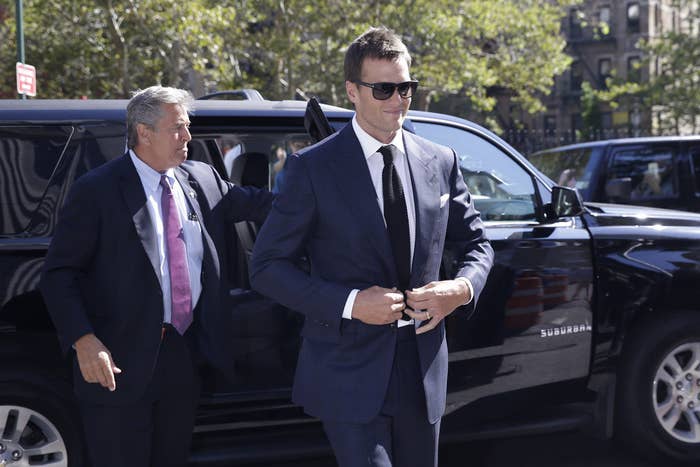
A federal judge on Wednesday grilled an attorney representing the NFL over the lack of direct evidence linking New England Patriots quarterback Tom Brady to under-inflated footballs used during the AFC Championship game.
In a crowded U.S. District courtroom in Manhattan, Judge Richard Berman took particular aim at a key finding in the investigative report commissioned by the NFL — — known as the Wells Report — that Brady was "at least generally aware" of two locker room attendants' scheme to deflate game-use footballs for competitive advantage.
"I don't know what to make of that conclusion," Berman said.
"It's saying that by the preponderance of evidence, Tom Brady knew," replied NFL counsel Daniel Nash.
"He didn't say that. He didn't say 'knew.' What he said was 'generally aware,'" Berman said of the author.
Brady's attorneys argue that according to the NFL's own standards, a player cannot be disciplined simply for being generally aware of another's misconduct.
Robert Kessler, who represents Brady and the NFL Players Association (NFLPA), also told Berman Wednesday that the NFL can't base discipline on evidence that is presumed to have existed or that might have been revealed — referring to the cell phone the quarterback destroyed rather than turn over.
"If you put wheels on my grandmother, she then might be a trolley car!" he quipped.
The tense exchanges came amid a debate over the strength of evidence produced in the seven months since the AFC Championship game.
"One thing that gets ignored about the Wells Report is that no smoking gun does not mean no evidence of culpability," Nash claimed.
But signaling a potential problem for the NFL, Nash faced pointed questioning over whether the author of the investigative report, Ted Wells, was truly independent.
"I worked at a big firm at one time, and for our clients, we were anything but independent," Berman said.
The judge pointed out that Wells made some of his notes on the investigation available to the NFL, which had hired him, before they were offered to Brady's camp.
Nash countered that Wells was "retained to get the facts" — even going so far as to seek a second expert opinion on the science of air pressure — and that any notes weren't as relevant as what was posted online when the report was completed.
"The argument about Wells' so-called independence is a red herring," Nash said.
Brady and the NFLPA also argue that the quarterback's appeal of his four-game suspension in the wake of the Wells Report was unfairly influenced by the same person who handed down the punishment: Commissioner Roger Goodell.
Goodell, who declined the union's request to recuse himself from the appeals hearing, upheld the suspension, citing new evidence of Brady destroying his cell phone instead of turning it over to the investigators.
Kessler argued that Wells had testified that he never gave Brady notice that there faced discipline if he did not turn over his phone. Had he, Kessler told the judge his client would have complied.
Kessler went on to call the cell phone issue "the most overblown issue in nearly 40 years of litigating."
He cited the privacy concerns that come with Brady's status as a celebrity beyond the football field given his marriage to supermodel Gisele Bundchen, and that those fears factored heavily in refusing to turn over a private cell phone.
Berman asked why Brady had not just gone through his texts and emails with an attorney and discarded irrelevant material before turning the phone over to the investigator. But Kessler said Brady was being advised at the time by his agent-attorney Don Yee.
"I'm sure Mr. Brady sees now that it should have been done differently," Kessler said.
Before sending both legal teams back to into private arbitration, Berman pressed for a settlement, warning that without one, the legal process could take two years, "and no one here wants this to go on that long."
But neither side appears close to settling. Brady will accept nothing short of an overturned suspension, but the NFL reportedly would require the quarterback to make an admission of guilt.
If it comes to Berman having to make a determination in the case — which he said has "varying strengths and weaknesses" on either side — his decision could be appealed to the Second Circuit Court of Appeals. Another settlement conference was scheduled for Aug. 19.

